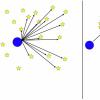I was looking at the title of this thread - "Policy measures to solve the coronavirus pandemic" and now two and a half years on it's clear there weren't any "policy measures" to solve the covid-19 pandemic.
This isn't in any way a criticism of the OP. Early on most of us weren't exactly sure what we were dealing with or had any familiarity of the history of viral pandemics. But now that we've been through the last 2+ years it's clear that vaccines weren't going to be a solution to this virus (RNA viruses mutate far too rapidly to be good targets for vaccines) and this virus was far too transmissible to be stopped by anything so weak as "policy measures".
This pandemic is going to be solved the same way similar pandemics have been solved since time immemorial - the virus will adapt to human hosts and in the process become less and less lethal as time goes on. This is the reason historical pandemic viruses from the past generally don't plague us today. For covid-19 much of this process has already occurred.
It seems that the best strategy was to do your best to avoid getting the virus for the first 18 months or so. If you avoided getting covid-19 till you got the Omicron variant - congratulations. You've probably done about as well as possible.
Eventually we'll all get covid-19. Probably multiple times. Eventually this will just be a straight forward cold. I got the Omicron variant in the first of August. I certainly have been sicker in my life but it did notably leave me tired and drained for about 3 weeks. But, if you look at the numbers it appears that the worst is now behind us. Knock wood.
Agree! When the godfather of coronavirus research himself Ralph Baric opines we shouldn't chase variants with vaccines and/or MABs, you'd think someone in the Medical Industrial Complex might listen:
https://www.nature.c...rticles/nm.3985
A SARS-like cluster of circulating bat coronaviruses shows potential for human emergence
"Evaluation of available SARS-based immune-therapeutic and prophylactic modalities revealed poor efficacy; both monoclonal antibody and vaccine approaches failed to neutralize and protect from infection with CoVs using the novel spike protein"
----------------------
So what is the best "policy measure" to resolve a coronavirus pandemic dilemma? Could it be maybe prompt therapeutic treatment? Ralph Baric opines once again:
https://pubmed.ncbi....h.gov/21079686/
Zn2+ Inhibits Coronavirus and Arterivirus RNA Polymerase Activity In Vitro and Zinc Ionophores Block the Replication of These Viruses in Cell Culture (2010 / PMID: 21079686)
“In this study we demonstrate that the combination of Zn2+ and PT at low concentrations (2 µM Zn2+ and 2 µM PT) inhibits the replication of SARS-coronavirus (SARS-CoV) and equine arteritis virus (EAV) in cell culture”
-------------------
Ahh, so zinc + ionophore might be the "best medicine" from what professor Baric has learned over his decades of research on coronavirus. As viral replication is peaking right around the first day or two of symptom onset, one might surmise prompt initiation of treatment might also be imperative.
Bottom line... The best, and perhaps only policy to solve the coronavirus pandemic would be for every household to have this combination therapy on hand, and initiate treatment at the first sign of infection; perhaps even before testing positive if you've got any symptoms during a major surge of infections in local population.
Dr Zev Zelenko put this protocol into practice way back in early 2020, and reported remarkable success in his peer reviewed and published paper:
COVID-19 outpatients: early risk-stratified treatment with zinc plus low-dose hydroxychloroquine and azithromycin: a retrospective case series study
"the odds of hospitalization of treated patients were 84% less than in the untreated group"
Dr Z's patents were symptomatic an average of 4 days when treatment was started, so imagine how effective initiation of therapy might have been if started within 1-2 days?

































































